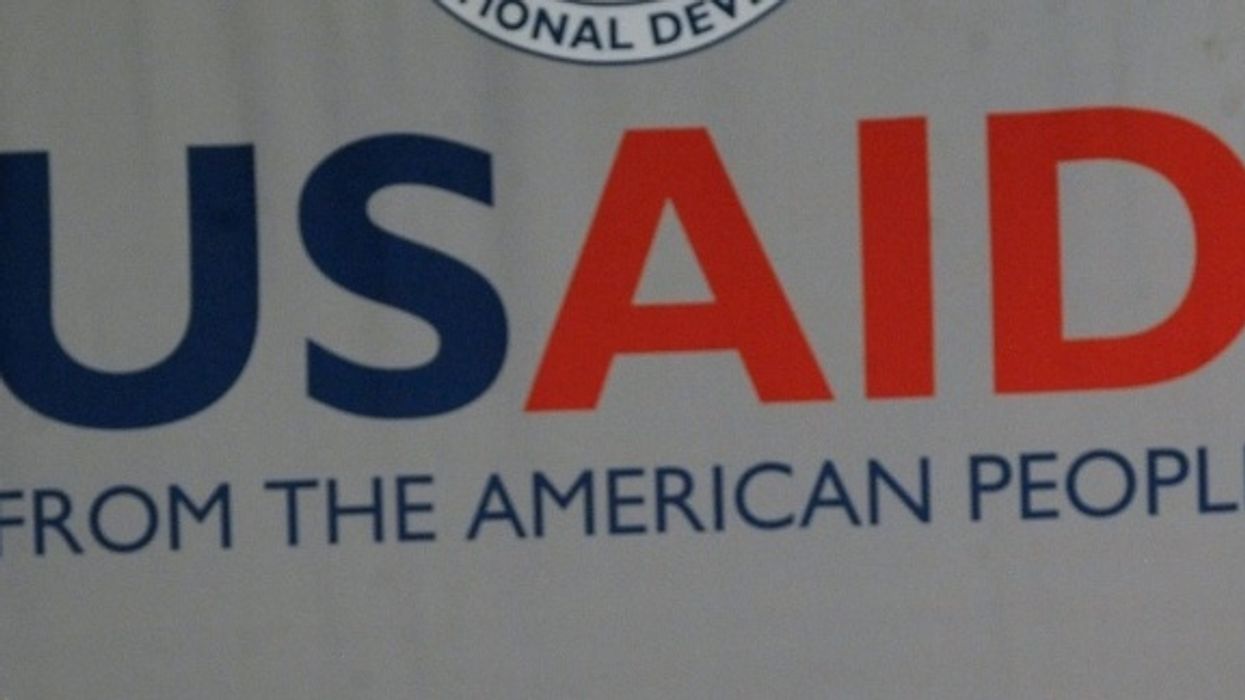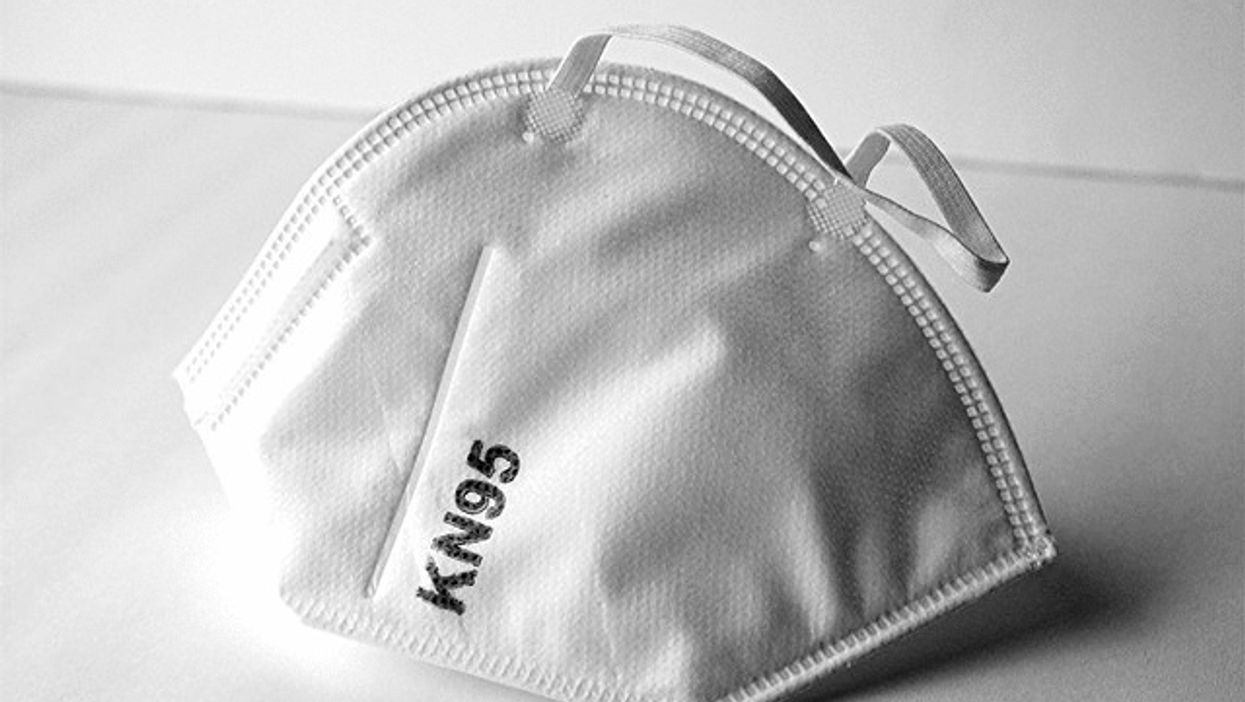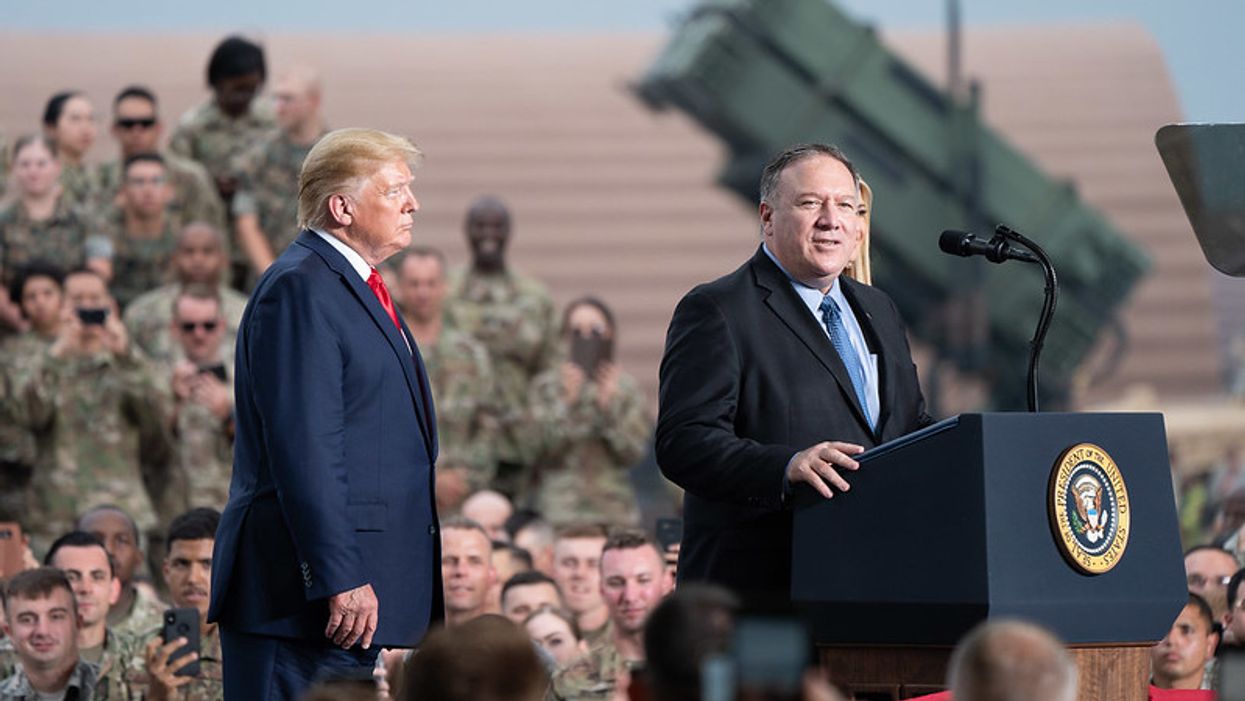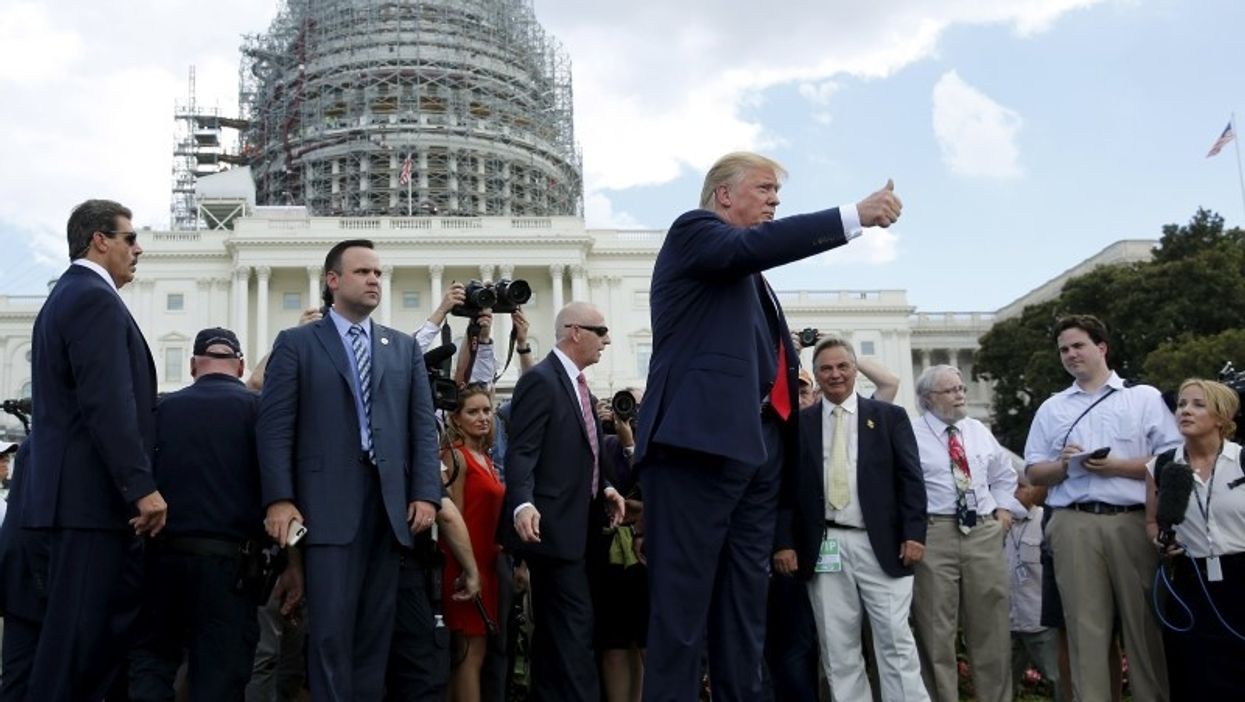“Sometimes this decision will be made for us by the White House (see… Iraq! And, increasingly, Syria),” said Hallam Ferguson, a senior official in USAID’s Middle East bureau, in an email seen by ProPublica. “We need to stay ahead of this curve everywhere lest our interventions be dictated to us.”
The email underscored what had become a stark reality under the Trump White House. Decisions about U.S. aid are often no longer being governed by career professionals applying a rigorous review of applicants and their capabilities. Over the last two years, political pressure, particularly from the office of Vice President Mike Pence, had seeped into aid deliberations and convinced key decision-makers that unless they fell in line, their jobs could be at stake.
Five months before Ferguson sent the email, his former boss had been ousted following a mandate from Pence’s chief of staff. Pence had grown displeased with USAID’s work in Iraq after Christian groups were turned down for aid.
ProPublica viewed internal emails and conducted interviews with nearly 40 current and former U.S. officials and aid professionals that shed new light on the success of Pence and his allies in influencing the government’s long-standing process for awarding foreign aid. Most people spoke on the condition of anonymity.
The Trump administration’s efforts to influence USAID funding sparked concern from career officials, who worried the agency risked violating constitutional prohibitions on favoring one religion over another. They also were concerned that being perceived as favoring Christians could worsen Iraq’s sectarian divides.
“There are very deliberate procurement guidelines that have developed over a number of years to guard precisely against this kind of behavior,” said Steven Feldstein, a former State Department and USAID official during the Obama administration. When politics intrude on the grant-making process, “you’re diluting the very nature of what development programs ought to accomplish.”
USAID regulations state that awards “must be free from political interference or even the appearance of such interference and must be made on the basis of merit, not on the basis of the religious affiliation of a recipient organization, or lack thereof.”
Last month, USAID announced two grants to Iraqi organizations that career officials had previously rejected. Political appointees significantly impacted the latest awards, according to interviews with officials and other people aware of the process. Typically, such appointees have little to no involvement in USAID grants, to avoid perceptions of undue political influence on procurement.
One of the groups selected for the newest awards has no full-time paid staff, no experience with government grants and a financial tie that would typically raise questions in an intense competition for limited funds. The second organization received its first USAID direct grant after extensive public comments by its leader and allies highlighting what they described as a lack of U.S. assistance to Christians. The two groups — a charity that primarily serves Christian Iraqis and a Catholic university — were not originally listed as front-runners, according to a document seen by ProPublica.
The Wall Street Journal and BuzzFeed have previously reported Pence’s interest in increasing foreign aid to Christians and his displeasure with USAID’s activities in Iraq.
Pence’s spokeswoman, Katie Waldman, did not respond to questions. A USAID spokeswoman did not respond to specific questions, including about Ferguson’s email, but said the latest grants were appropriate.
“The Trump Administration has made responding to the genocide committed by the so-called Islamic State of Iraq and Syria (ISIS) against religious and ethnic minorities a top priority,” said the spokeswoman, Pooja Jhunjhunwala. “Assistance to religious and ethnic communities targeted by ISIS is not a departure from the norm, but rather a continuation of USAID’s rich history of promoting inclusive development and defending human dignity and religious freedom in our partner countries.”
Approximately 97 percent of Iraq’s population is Muslim, according to the most recent U.S. figures available. Religious minorities — including Christians, Yazidis and others — make up around 2 percent to 3 percent of Iraq’s total population.
The Trump administration’s efforts to steer funding to these minorities in Iraq stand in stark contrast to its overall approach to foreign aid. It has repeatedly proposed cutting U.S. diplomatic and foreign assistance budgets by billions of dollars. In August, as the White House was considering cuts to an array of foreign aid programs, it shielded funding for religious minorities abroad, according to news accounts.
As Trump mounts a 2020 reelection effort, he is taking steps to solidify his conservative Christian base, including his decision last week to install his spiritual adviser, Florida televangelist Paula White, in a White House position. Increasing aid to Christians abroad is a core value for his supporters.
In a speech last month at the Values Voter Summit in Washington, a major gathering of the religious right, Trump touted his administration’s work on behalf of religious minorities in Iraq and Syria.
“Other presidents would not be doing that,” he said. “They’d be spending a lot more money, but they’d be spending it on things that would not make you very happy.”
Late in the Obama administration, USAID’s activities in Iraq focused on an effort by the United Nations to restore basic services as soon as cities had been liberated from Islamic State rule.
By the end of 2016, the United States had contributed over $115 million to the effort through USAID, and other countries had contributed hundreds of millions of dollars more. U.S. officials credit the U.N.’s work with enabling millions of Iraqis to return to their homes soon after the fighting was done instead of languishing in refugee camps.
“Here’s another example of when the U.N. and the United States work together, really good things can happen,” said John Allen, the former special presidential envoy to the global coalition formed to defeat ISIS, at an event at the Brookings Institution in September.
Robust U.S. support for the U.N.’s work initially carried over into the Trump administration. In July 2017, the administration announced that USAID would provide an additional $150 million to the U.N. Development Program’s Iraq stabilization fund, bringing the total U.S. contribution to more than $265 million since 2015.
But by then, U.S. officials in Iraq were sensing dissatisfaction among some Iraqi Christians and American religious groups with the U.S. strategy and the U.N.’s work. Trying to head off problems, U.S. officials urged the U.N. in the summer of 2017 to pay special attention to the Nineveh Plains, an ethnically and religiously diverse region of northern Iraq where many of the country’s Christians live.
U.N. officials were reluctant, arguing their assistance could go further in dense urban areas like Mosul, as opposed to the Nineveh Plains, a stretch of farmland dotted by small towns and villages.
“They were going for the biggest bang for the buck,” one former U.S. foreign service officer said.
Dylan Lowthian, a UNDP spokesman, said the agency worked closely with local Christian leaders in 2017 to encourage more people to return to the Nineveh Plains.
“UNDP is one of the largest supporters of minority communities in Iraq in terms of volume of projects, impact, and funding,” Lowthian said.
But the pressure from Washington built. Influential religious groups like the Knights of Columbus and current and former Republican members of Congress advocated throughout 2017 for direct U.S. aid to religious minorities, including Christians and Yazidis. They said that the groups merited special attention because they had been targeted for genocide by Islamic State and that local churches had proven track records of delivering aid quickly and reliably. Furthermore, Christians — who fled the country in droves after the 2003 U.S. invasion of Iraq — were at risk of disappearing from Iraq altogether if they didn’t receive help, they argued.
Bashar Warda, a powerful archbishop based in Erbil, Iraq, was a key figure in this effort. “The Christians of Iraq desperately need American government humanitarian aid now, and we need it to be delivered in a manner to ensure it actually reaches us and does not get absorbed and redirected in the existing aid structures,” he said in a 2017 interview with Crux, a Catholic- focused publication. “While the U.S. has donated generously to the overall humanitarian aid effort in Iraq, almost none of this aid reached the Christians.”
Warda met with Pence in late 2017 and stood beside Trump in the Oval Office in 2018 as he signed a bill authorizing the State Department and USAID to provide relief to victims of Islamic State, particularly religious minorities. Warda had advocated for the bill’s passage.
Warda’s and others’ argument on the flow of aid resonated with the Trump administration’s distrust of multilateral organizations, especially the U.N., and a desire to help Christians worldwide.
Many career officials at the State Department and USAID supported the broader scope of the U.N.’s work. They acknowledged it wasn’t perfect — it could be slow, and the U.N. was not adept at communicating with local communities — but said the rebuilding had benefited wide swaths of territory that included both Muslims and minority groups.
Privately, some officials felt that Warda’s and his allies’ lobbying efforts in Washington were downplaying how the U.N. projects benefited their communities. And serving Iraq’s Sunni Muslims, they said, was essential to ensuring that Islamic State, which drew its ranks from Sunnis, did not make a resurgence.
“We were focused on the overriding policy priority of making sure that areas where young men with guns and other weapons were wandering around got the vast majority of the funding,” one current U.S. official said in an interview.
As of July, USAID and the State Department had announced nearly $373 million in funding for “persecuted ethnic and religious minorities in Iraq” since 2017. Jhunjhunwala, the USAID spokeswoman, said the U.S. government had provided over $1.5 billion in assistance to Iraq in 2017 and 2018, “the vast majority in areas inhabited by Sunni and Shia Muslims.” The Obama administration did not publicize its spending on Iraqi religious groups in the same way, making an exact comparison difficult.
Stephen Rasche, who works closely with Warda and serves as his spokesman, told ProPublica that U.N. reports detailing its rebuilding work in 2016 and 2017 “were highly misleading and could not be substantiated as they applied to assistance in the Christian towns.”
“In all our interactions with State/AID they were relying almost exclusively on the U.N. reports rather than making their own, first-hand inspections,” he said in an emailed statement. “Our position was that we were there on the ground and could not find evidence of the work that the U.N. said was being done.”
Lowthian said that all UNDP projects are tracked by a “rigorous and robust” monitoring effort, and that project details are shared regularly with partner countries.
Career officials also expressed concerns at the time that targeting federal funds toward particular minority groups on the basis of religion could be unconstitutional. USAID rules bar providing funding for explicitly religious activities such as worship or proselytizing. But faith-based groups can still receive U.S. funding, as long as they are inclusive and do not use the funds for religious programming.
USAID regulations mirror the U.S. Constitution’s establishment clause, which broadly prohibits government actions that favor one religion over another. Over time, Trump appointees have grown exasperated at pushback that mentioned the clause, one official said.
“They find it very constraining,” this person said. “They get frustrated that we can’t just do direct support.” Still, several officials said, career attorneys at USAID painstakingly review its programming in Iraq to ensure it is legal.
And USAID and State Department officials questioned whether Christian groups were significantly needier than the broader Iraqi population victimized by Islamic State, including Shiite and Sunni Muslims.
“There was a pushback, a feeling like we shouldn’t be doing this, first of all because of our own policies and regulations, and secondly because they’re not worse off than the others,” a former USAID official said.
Initially, Pence’s office and political appointees at USAID were focused on helping Christians, with little attention to Yazidis, a small, ancient sect that was targeted in an especially cruel manner by Islamic State militants, said a current official and a former foreign service officer. Over time, career officials “helped educate” political appointees on the extent of the Yazidis’ suffering, in hopes of getting their support for directing some aid at non-Christian groups, the former foreign service officer said.
“There was a very ideological focus on Christians, and most of the questions were about Christians,” this person said. “We were trying to get them to focus on others in the minority communities that might need assistance.”
Some also felt that if the U.S. were perceived as openly favoring particular groups, it could lead to further tensions in a country with deep and complicated sectarian divisions. Even some Christian Iraqis, several current or former U.S. officials said, did not want to be singled out by USAID for help, because they feared that preferential treatment would only add to instability.
But Trump appointees at USAID in favor of sending more aid to Christians — including Middle East bureau official Hallam Ferguson and Bill Steiger, the agency’s chief of staff — discounted career officers’ concerns, arguing that they had heard differently from the Christian groups focused on Iraq with whom they were in touch, one former USAID official said. Trump appointees “seemed convinced that an imbalance did exist” in how Christians were being treated, a U.S. official said.
Steiger, who served at the Department of Health and Human Services during the George W. Bush administration, has been a key conduit through which Pence’s office has exerted pressure on USAID, several officials said.
Trump appointees in Washington pressed officials to frequently visit the areas where Christians lived, seemingly unaware of the weeks of preparation and security logistics needed to make even one such visit happen, one current U.S. official and the former foreign service officer said.
By September 2017, Steiger was holding meetings with USAID officials to discuss how to help religious minorities in Iraq. And by early October, USAID’s leadership had decided to try to satisfy Pence’s preferences through new grants focusing on northern Iraq.
While the grant process was being worked out at USAID, Pence blindsided officials in October 2017 when he declared to an influential Christian group in Washington that Trump had ordered diplomats to no longer fund “ineffective” U.N. programs. USAID would now directly help persecuted communities, he said.
“It sent us scrambling the next day,” one U.S. official working on Iraq at the time said. “That seemed to me, in retrospect, a turning point in saying, ‘We’ve got a real interest in doing more to help minorities, especially Christians,’ to, ‘OK, now we’re really going to shift some funds.’”
The $150 million that USAID had pledged to the U.N. effort in Iraq in July 2017 had been divided into two tranches of $75 million each. After Pence’s comments, USAID renegotiated its agreement with the U.N. so that the majority of the first payment, $55 million, would still go to the U.N. but would be earmarked for religious and ethnic minorities in Nineveh Province.
For new grants, which were separate from the U.N. funding, USAID hosted 33 organizations at a two-day March 2018 Baghdad workshop. They included large, established faith-based groups like Samaritan’s Purse and Catholic Relief Services, as well as smaller, little-known Iraqi organizations, according to a list of attendees obtained by ProPublica through a public records request.
The attendees included two Pence aides: Sarah Makin-Acciani and Steve Pinkos. Before joining Pence’s team, Makin-Acciani worked for Republican lawmakers, as a lobbyist for the U.S. Consumer Coalition and for the Trump campaign. Pinkos had worked for a lobbying firm, as an aide to Republican Rep. Kevin McCarthy and in the U.S. Patent and Trademark Office. Neither of them appear to have expertise in development or foreign aid issues. Neither Makin-Acciani nor Pinkos responded to messages requesting comment.
Their presence at the Baghdad meeting, which was first reported by The Wall Street Journal, unsettled participants, according to four people who attended the event or were briefed on it. White House officials rarely, if ever, are so deeply involved in agency grant-making.
People “assumed they were there for a political reason or to put pressure on the process,” said one participant.
After introductory remarks by then-U.S. ambassador to Iraq Doug Silliman, attendees split into smaller groups to discuss possible collaborations. Makin-Acciani and Pinkos mostly observed and asked questions, several people who attended the meeting said. But at one point, the pair objected to a programming idea, saying it would take too long and not be valuable, two people who witnessed the interaction said.
“They were looking for quick fixes,” said one of the people.
Back in Washington, Mark Green, the head of USAID, expressed discomfort to a colleague about potential interference by Pence into the grant process, one former U.S. official said.
Ultimately, later that spring, career officials made the final grant decisions and gave millions of dollars in funding to large, established organizations: Catholic Relief Services, Heartland Alliance and others. Awards were structured as umbrella grants that included sub-awards to small Iraqi organizations. USAID rejected some bids by smaller, untested groups with no prior experience with the agency.
“We still try to stick to our principles, that you gotta have a good proposal and you gotta have your qualifications there and so on, and they didn’t meet the standards,” a former USAID official said.
One rejected application was a bid by the Catholic University in Erbil and the Nineveh Reconstruction Committee, a coalition of three major Christian denominations in Iraq. Warda, head of the Chaldean Catholic archdiocese in Erbil, also heads the board of trustees at the university. (Chaldean Catholics, an Eastern Rite of the Roman Catholic Church, make up about two-thirds of Iraq’s Christians.)
Rasche, who is a vice chancellor at the Catholic University in Erbil, was formerly president of Nineveh Reconstruction Committee-USA, a now-defunct nonprofit formed to further NRC’s aims by winning U.S. government grants. Rasche said he and Warda were in Washington when their proposal was rejected and promptly told their “friends and partners” of their denial.
Before USAID had itself announced the awards, Fox News published a detailed account criticizing USAID’s activities in Iraq. “We are worse off now than we were two years ago,” Warda said to Fox.
Two days later, former Reagan administration national security adviser Robert McFarlane and New Jersey Republican Rep. Chris Smith co-authored an op-ed in The Wall Street Journal criticizing USAID’s decision to reject the two Christian organizations. They said it showed career USAID officials were ignoring Pence’s preferences. The title of the op-ed: “Iraqi Christians Are Still Waiting, Mr. Pence.”
Smith’s spokesman and McFarlane did not respond to interview requests.
On June 8, 2018, a day after the op-ed was published, Pence’s spokeswoman issued a terse statement, saying he “will not tolerate bureaucratic delays in implementing the Administration’s vision.” Pence also directed Green to travel to Iraq and report back on how to resolve delays.
That same day, Pence’s then-chief of staff, Nick Ayers, called Steiger to demand somebody at the agency be punished for the failure to provide aid to Christian groups quickly enough, according to several people familiar with the conversation. Ayers did not respond to requests for comment.
Green’s reaction was to remove Maria Longi, a career civil servant and a top official in USAID’s Middle East bureau. Though still on USAID’s payroll, she now teaches national security strategy at the National War College.
Longi’s dismissal and Pence’s displeasure with USAID had been reported by BuzzFeed and The Wall Street Journal, though the extent of Pence’s role in her reassignment had not been. Longi declined to answer questions.
The move reverberated among career officials, who traded text messages and emails expressing shock. USAID insiders coined a term for what had happened to her: Longi had been “Penced.”
Concern spread even among Trump appointees that their jobs might be threatened. “What it did instill in the Middle East bureau was fear among the political appointees that they could be thrown out at any time,” a former USAID official said.
Last month, USAID announced $4 million in new grants to six Iraqi organizations as part of an effort in Iraq and other countries to work with small, local groups that have done little prior work with the agency. Two of the winning groups were the Shlama Foundation, a small charity, and the Catholic University in Erbil.
Two USAID political appointees were involved in awarding those grants: Ferguson, the second-highest-ranking official in USAID’s Middle East bureau, and Samah Norquist, the agency’s adviser on religious pluralism in the Middle East and wife of conservative tax activist Grover Norquist.
Ferguson and Samah Norquist were included in the selection process for the newest grants, and one official said Ferguson oversaw the final determinations.
A former USAID official said Norquist was “really involved in the details” of the grants but seemed to have little awareness of standard USAID practice when meeting with grantees.
“She was swimming in the dark, and it was really quite clear that she didn’t know the first thing about grant-making,” such as what information was proper to share and how to ensure an open award process rather than one targeting specific groups, the former official said.
Norquist expressed support for Trump’s 2020 reelection at a State Department forum in July, a statement that experts said likely violated a law forbidding government officials from engaging in political activities on the job. The incident sparked complaints to an independent agency, which determined in October that Norquist’s comments did not violate the law.
A third political appointee at USAID, Max Primorac, the agency’s envoy in Erbil for minority assistance programs, tweeted praise for the Shlama Foundation months before USAID announced the final grant winners. The group replied with thanks, tagging Pence’s Twitter account. Shortly after the award announcement, Primorac met with a Shlama Foundation board member during a visit to Michigan.
Primorac is known among U.S. officials for his close working relationship with Pence’s office. Prior to joining USAID, Primorac served with Rasche at NRC-USA, as secretary and treasurer of the nonprofit. The two submitted an unsolicited $22.5 million bid to rehabilitate Christian towns to USAID in 2017, which was not awarded.
Asked if any Shlama Foundation officials were in touch with Primorac, Norquist or Ferguson prior to its award being announced, board member Ranna Abro declined to answer specifically.
“USAID was familiar with our organization as it is well-known by the local community in the Nineveh Plains,” she said. “We have met USAID several times along with all other organizations serving the same area.”
Rasche said Norquist ran a workshop in Erbil for organizations interested in applying for the new grants, which staff members of the Catholic University in Erbil attended. Rasche also spoke with Ferguson two to three times about the grant dates and funding cycles, he said.
Five current or former U.S. officials said involvement in grant decisions by political appointees — particularly by someone as senior as Ferguson — is highly unusual. USAID grants are typically decided by a review committee and a contracting officer, all of whom are career officials.
“USAID procurement rules with technical review panels are strict, as they should be, to avoid any political interference on the use of U.S. taxpayer dollars,” said Paige Alexander, a former senior USAID official who served during the Clinton, Bush and Obama administrations.
Jhunjhunwala, the USAID spokeswoman, said the award process is rigorous “and follows all federal regulations.” Ferguson, Norquist and Primorac were not on the committees that made the recommendations, she said.
The new grants have “empowered local organizations to solve problems not adequately addressed by other USAID investments and that directly respond to the grassroots needs of conflict-affected communities,” she said.
Like the Catholic University in Erbil, the Shlama Foundation had previously applied and been rejected for the 2018 grants. Shlama had complained about the rejection via Twitter, and Abro confirmed the tweet referred to the same grant for which the Catholic University in Erbil was also rejected.
For the newest awards, a document seen by ProPublica shows that neither the Shlama Foundation nor the university were originally included in a list of leading applicants that circulated within USAID.
The Shlama Foundation will receive $1 million over two years for a project focusing on solar energy, a pittance in the overall U.S. foreign assistance budget. But the money is three times what the nonprofit has taken in from charitable donations since 2014, according to its website. It has never before received government grants, Abro said.
“The Shlama Foundation, USAID and our vendor partners are certainly experienced and capable of implementing this solar program for a greener future,” Abro said.
Aside from its small size and lack of federal grant experience, Shlama was an unconventional choice for another reason. Last year it received $10,000 in donations from the Clarion Project, a nonprofit organization which researchers at Georgetown University’s Bridge Initiative said “advances anti-Muslim content through its web-based and video production platforms.”
A Shlama Foundation board member also appeared in Clarion’s 2017 documentary Faithkeepers, about the persecution of Christians in the Middle East. The film focuses on atrocities committed by Islamic State, but also depicts Islam overall as a religion that seeks to subjugate minorities. Zach Sicherman, an associate producer for the film, declined to respond to questions.
Clarion also did not respond to questions. It describes itself as a “non-profit organization that educates the public about the dangers of radical Islam and other extremist ideologies.”
Abro said that Shlama did not solicit the Clarion donation, and that it appeared in the documentary because “we value transparency and are open to participate in interviews from all sides.” The film’s website includes a donation page that benefits Shlama.
Foreign aid experts said USAID typically examines an organization’s major donors to protect the agency from perceptions that it is benefiting biased groups, but they disagreed over whether the link to Clarion should have disqualified Shlama for U.S. funding.
The Catholic University in Erbil’s new grant from USAID is its first direct agency award. The award, $700,000 over one year, will support courses for “widows, victims of abuse, and former captives of ISIS,” according to a USAID press release.
The newest grant “has come very late in the day, and our award is comparatively quite small,” Rasche said. He attributed the award not to Warda’s public statements but rather to the passage of the 2018 bill.
USAID’s inspector general is investigating some of the agency’s activities in Iraq, the watchdog said, though it is unclear what sparked the probe.
USAID is now expanding its emphasis on religious minorities far beyond Iraq. In December, a month after his email about White House pressure, Ferguson told USAID mission directors in the Middle East that agency leadership had identified up to $50 million it planned to use in 2019 for “urgent religious freedom and religious persecution challenges,” according to a second email seen by ProPublica. He asked mission directors to submit programming ideas.
In a follow-up email in June, also seen by ProPublica, Ferguson wrote that in addition to Iraq, religious and ethnic minority programming was planned for Lebanon, Morocco and Tunisia.













